Reading the Bible can feel overwhelming, especially if you’re new to it. With 66 books, so many authors, and thousands of years of history packed into these holy pages, it’s natural to wonder, “Where do I even start?”
But here’s the thing – you don’t have to read the entire Bible in one sitting or have a theology degree to understand its messages.
Whether you’re exploring faith for the first time, rekindling your relationship with God, or simply curious, this guide will walk you through how to read the Bible with confidence and intention.

Keep It Simple
First and foremost, don’t overcomplicate this process. The Bible was written for people like you – ordinary men and women seeking to know God and His purpose for their lives. Here’s how you can begin without feeling overwhelmed.
Start with Prayer
Before you even open the Bible, take a moment to pray. Prayer invites God into your reading experience and helps you focus. A simple prayer like, “Lord, guide me as I read Your Word today. Help me understand what You want to say to me,” can make a big difference.
Pick a Starting Point
One of the most confusing parts of reading the Bible is figuring out where to begin. Contrary to popular belief, you don’t have to start with Genesis (unless you really want to). Here are a few great options to consider, along with pros and cons for each starting point:

- The Gospel of John (New Testament)
-
- Pros: Provides a beautiful overview of Jesus’ life and teachings. Great for understanding the foundations of Christianity.
- Cons: Some concepts, like “the Word,” may require additional explanation for beginners.
- Psalms (Old Testament)
-
- Pros: A great place to go if you’re seeking comfort or want to explore prayers and songs dedicated to God.
- Cons: Doesn’t provide much narrative or background on Christianity itself.
-
- Romans (New Testament)
-
- Pros: Explains Christian theology and core beliefs in a structured, logical way.
- Cons: Heavy on doctrine, which may not be ideal if you’re looking for engaging storytelling. I would recommend new or young Christians to start with John before Romans.
-
- Genesis (Old Testament)
-
- Pros: Perfect for understanding how it all began. Covers creation, early human history, and God’s first covenant with His people.
- Cons: Some sections (like genealogies) can feel dense or dry for beginners.
-
Pick a book that resonates with where you are right now in your spiritual walk and take it one chapter at a time. Sometimes, God will speak to your heart on where to start reading.
Highlight, Take Notes, and Use Commentary

The Bible is meant to be engaged with, not just read passively. Though there is nothing wrong with just reading. I have found engaged reading and passive reading both beneficial. You just want to have a mix and lean toward engaged more than passive.
Keep a highlighter (use gel or special highlighters so as not to damage your Bible) or pen nearby to mark verses that stand out to you. Jot down thoughts or questions in the margins or in a journal.
If a passage feels unclear, look up commentary in a study Bible or online tools like Blue Letter Bible. Insights from theologians can add layers to your understanding of certain scriptures.
Practical Tips for Reading
Once you’ve started, the next step is to make reading the Bible a consistent and enriching part of your life. Here are some practical tips that will help you along the way.
Set a Reading Schedule
Carve out a specific time to read the Bible each day. Whether it’s 10 minutes in the morning or 20 minutes before bed, consistency is key. Even if it’s as little as a chapter a day. Getting into God’s Word can make a huge impact on your life.
If you’re someone who likes structure, consider following a Bible reading plan (many are available for free online or through Bible apps).
Pray for Understanding
Throughout your reading, stop and pray when something confuses or moves you. Ask the Holy Spirit for clarity and wisdom to truly understand the message of the text.
Join a Bible Reading Group
If you need a little extra support or love being around other people. Seek out a Bible group at your church or join an online community. Discussing Scripture with others can offer new perspectives and keep you motivated.
Plus, sharing this journey with like-minded people creates a sense of belonging. This is the heart of true fellowship.
Use Study Resources
Invest in study tools like a good study Bible (I love the NIV Life Application Study Bible), Bible dictionaries, or even apps like YouVersion. Having context about biblical times and themes can make the stories more relevant and relatable.
Avoiding Common Pitfalls
It’s not uncommon to face challenges when starting your Bible reading journey. I have faced them, especially the time one! Here’s how to tackle a few common pitfalls.

Feeling Overwhelmed
Seeing the length and breadth of the Bible can feel daunting. Remember, you’re not in a race. There’s no need to finish it quickly or comprehend everything at once. Reading one chapter a day is more than enough.
Reading the Bible is part of a healthy Christian life. Enjoy it slowly, you are not in a competition with anyone.
Misunderstanding Context
The Bible was written in different eras, languages, and cultural contexts. Without context, some verses can be misinterpreted. Using a study Bible or commentaries can help you grasp the full meaning.
Skipping Difficult Passages
Some parts of the Bible can feel confusing or challenging (looking at you, Revelation). When you come across a tough passage, don’t skip it. Take time to pray, research or ask mentors for guidance.
Forgetting to Make Time
Life gets busy, and it’s easy to push Bible reading down the priority list. I feel like in this day and age this might be the biggest pitfall for people. Our phones/tablets/social media, busy schedules, and life tend to seek our attention 24/7.
Set reminders and treat this practice as sacred time for yourself and God. Make it a priority!
Resources for Further Study
When you’re ready to go deeper, there are plenty of resources to support your spiritual growth. Here are some of our recommendations:
- Bible Study Apps: YouVersion, Blue Letter Bible, Olive Tree.
- Books: There are TONS of books and Bible studies out there that can help you in your Bible reading and understanding.
- Websites: BibleGateway.com, GotQuestions.org.
- Local Groups: Check your church bulletin or local community for Bible study groups.
These tools can deepen your engagement and help answer questions as they arise.
Begin Your Journey with Confidence
Reading the Bible is a lifelong adventure—one that will continually draw you closer to God and transform your daily life. Remember, it’s okay to start small and take it slow. The most important thing is to remain consistent and allow God’s Word to inspire and guide you.
If you’re still unsure where to begin or need personalized guidance, reach out to your local church or pastor They’d love to help you on this incredible spiritual journey.
And like always I hope this post has encouraged you and helped you!

Melissa is a passionate minister, speaker and an ongoing learner of the Bible. She has been involved in church and vocational ministry for over 18 years. And is the founder of Think About Such Things. She has the heart to equip the saints by helping them get into the Word of God and fall more in love with Jesus. She also enjoys family, cooking, and reading.
She has spoken in churches in California, Oregon, Texas, and Mexico and has been featured in Guidepost Magazine and All Recipes Magazine. Read More…
